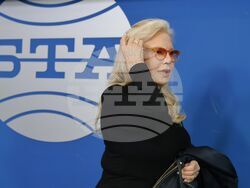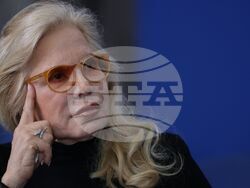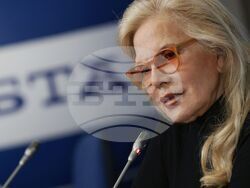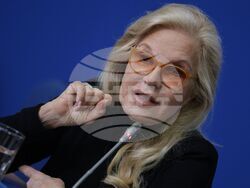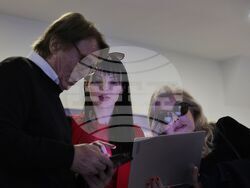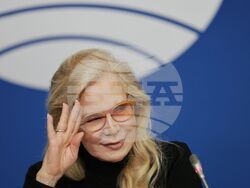site.btaSylvie Vartan: In Bulgaria, I Learned to Love the Things I Love and to Recognize What Is Missing


Bulgarian-born French singer Sylvie Vartan said she feels "deep down, I am Bulgarian" during a news conference for the CineLibri international film festival at the BTA National Press Club in Sofia on Friday.
"My feelings have been enriched and refined over the years, but I have always remained Slavic – I am Bulgarian. I carry all the traits of the Slavic spirit, and my character is many-sided. Even as I travel around the world, I remain connected to this element that is nostalgic, gentle, and deep. I feel the bond with the Bulgarian language, which I have never forgotten," Vartan said.
Asked by BTA what remains Bulgarian for her despite time and distance, she recalled: "At the age of eight, I had to learn French. I wanted to be like everyone else. At school, I studied French, which is not easy to learn, and I became French. I was lucky. But in Bulgaria, I learned to love the things I love and to recognize what is missing. That is a skill built into me. That is why I will always remain, deep down, Slavic and sensitive."
The French music star of Bulgarian origin is a special guest at the CineLibri film and literature festival. Audiences will have the chance to meet her twice – on October 25 for the premiere of Sylvie Vartan. Out of Love and on October 26 for the premiere of Maman et le miracle de la vie (Mother and the Miracle of Life).
Vartan told the media that she loves the mountains, the fresh air, and the village of Lakatnik. "When I was in Bulgaria in 1990, I spent some time there, looked at the houses and the people, and thanks to television, I was able to visit Rila and the Rila Monastery, where I sang with a girls’ choir aged seven to twelve with wonderful, truly fantastic voices. I also love Varna, where I got lost as a child. The city has changed a lot. I don’t know the area around Sofia that well, but I am getting to know Plovdiv – a city of art and culture. I have a cousin who lives there, and I’ll gladly visit," she said.
"I don’t think I pay any price for being Sylvie Vartan," she noted. "Especially compared with the price many other people pay. I think I’ve been extremely lucky to fulfil my dreams. I live in a free country, I have food, wonderful friends, and I’ve shared so many magical moments with audiences over the years. So I’m grateful for a life that can really make your head spin."
"Music has always been part of my life. My life has always been musical. So it’s not about which music changed me. My father played opera and French chansons, but when I heard rock’n’roll coming from America, that truly changed me. That’s when I felt the urge to sing that kind of music. It took a long time for us to hear those songs from America, and as you know, we used to make adaptations of them. But over the years, tastes change, people evolve, yet music remains alive – and good music is always good music," Vartan said.
She added that it is a good sign when small children hear music, because they immediately start to move, because music is magical. "My father sang many kinds of songs, and I also wanted to sing children’s songs. I recorded two albums of them, and it was a great joy to perform for children. The song 'Hey, Little Hands' is the only one I passed on to my children – it’s the only one they know in Bulgarian. I don’t think music has followed me – it truly possesses me," she said.
"I wouldn’t say I teach my children lessons," she continued. "Because in an unconscious way, by showing love and respect and living life as correctly as possible, you set an example. My children know about my parents – they were wonderful – but they never taught me anything; they showed me. My children live with my feelings, with my Bulgarian heart, and with their Hungarian and French emotions. They know their past and where they come from. Whether they remember what I tell them, I don’t know, but they feel the love. Cooking is also important – I make banitsa and moussaka, and they love them. Food brings people together; it shows solidarity. We gather around the table and share – it’s a magical moment I share with friends too. Yesterday, we went to a restaurant where I had the chance to try dishes like kyopolou, things I also make myself."
"My Bulgaria is the one from my childhood – the one I knew best and thought would last forever. I never imagined it would change so much. That’s Bulgaria up until the end of 1962. Of course, I followed all the changes as it became a free country," Vartan said. Her first emotional shock, she recalled, came when she boarded the train to France; the second was in 1990. "And the third was seeing how Bulgaria has changed, how progress has appeared, and being able, at least a little, to take part in that change," she added.
"Among my friends, I can mention Iossif Surchadzhiev – we used to play together as children in the yard. I have a photo with him, with his tousled hair. I remember our childhood games. Another name is the pianist Alexis Weissenberg. The names escape me now, but my head is full. And my heart is full," Vartan said.
/YV/
Additional
news.modal.image.header
news.modal.image.text
news.modal.download.header
news.modal.download.text
news.modal.header
news.modal.text


